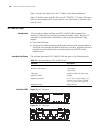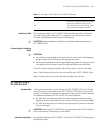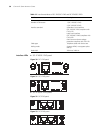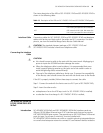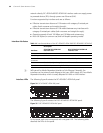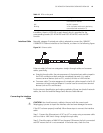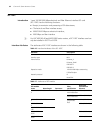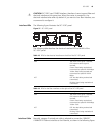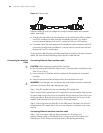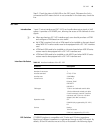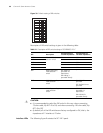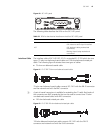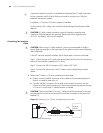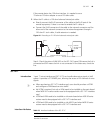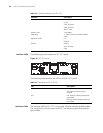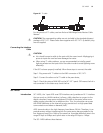
44 CHAPTER 2: SMART INTERFACE CARDS
Figure 38 Ethernet cable
Ethernet cables fall into two categories: straight-through cables and crossover
cables, specifically,
■ Straight-through cable: the wire sequences of the twisted pair cable crimped in
the RJ-45 connectors at both ends are completely the same. It is used to
connect terminal devices (such as PCs, routers) to Hubs or LAN Switches.
■ Crossover cable: The wire sequences of twisted pair cable crimped in the RJ-45
connectors at both ends are different. It can be used to connect two terminal
devices (such as PCs and Routers).
For the pinouts, identification and making methods of these two kinds of network
cables, see Low-End and Mid-Range Series Routers Cable Manual.
Connecting the Interface
Cable
Connecting Ethernet fiber interface cable
c
CAUTION: When connecting optical fiber, note that
■ Do not bend optical fiber with undue stress. The bend radius should be no less
than 10 cm (3.9 in.);
■ Ensure that the Tx interface and Rx interface of the module are connected
correctly;
■ Keep the sectional surface of optical fiber clean and free from dust.
w
WARNING: Laser Danger! Do not observe the optical fiber connector connected
with laser; otherwise, laser may damage your eyes.
Step 1: Plug SFP module into the corresponding SFP module slot.
Step 2: Locate the Rx optical port and Tx optical port on the module. Plug one end
of optical fiber into the Rx port of the module, and the other end into the Tx port
of the peer device. Plug one end of another optical fiber into the Tx port of the
module, and the other end into the Rx port of the peer device;
Step 3: Check the status of LINK LED on the GBE panel: ON means the Rx link is
connected and OFF means the Rx link is not connected. In the latter case, check
the line.
Connecting Ethernet electrical interface cable
Step 1: (Use a crossover cable for the connection to a PC/router and
straight-through cable to a Hub/LAN Switch.) Plug one end of the cable to an
Ethernet port of the Router and another end to the desired peer device;



